Edinburgh TV Festival: Why are we so in love with dating shows?
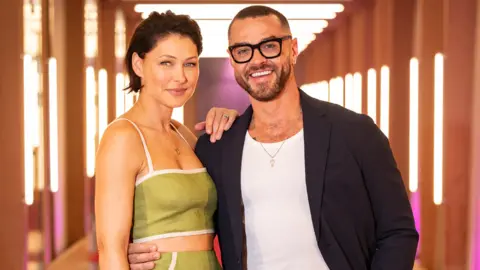 Tom Dymond/Netflix
Tom Dymond/NetflixThere are more TV dating shows than ever, with ideas that get ever more inventive and outlandish. Why have we fallen head over heels for them?
If you're looking for shows about looking for love, there's no shortage of choice.
There's Love Island, Love Is Blind, Love in the Flesh and E4's newly-announced Love Triangle.
You could make a date with First Dates, Dinner Date and Celebs Go Dating. Or there's Naked Attraction, Married at First Sight, Too Hot To Handle and Sexy Beasts (in which daters wear animal prosthetic disguises).
There are shows in which singles get help from siblings (Dated and Related), friends (Date My Mate) and children (ITV's new My Mum Your Dad).
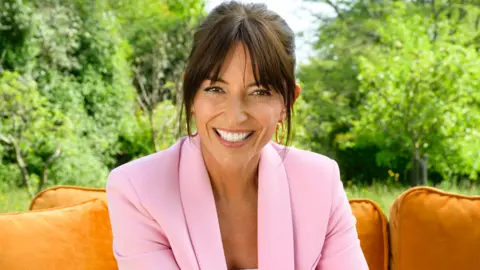 ITV
ITVThere are now LGBT shows like Netflix's The Ultimatum and BBC Three's I Kissed a Boy - with I Kissed a Girl about to start filming.
The list goes on, and the boom in dating programmes was the subject of a discussion at the Edinburgh TV Festival this week.
Their popularity is down to the fact that "it's never been harder to find love", according to Channel 4's Married at First Sight UK commissioning editor Lee McMurray.
"You hear that from the cast and contributors of all the shows. Everyone who applies to Married at First Sight and the other dating formats I've worked on say it over and over and over, and I think it's true.
More from the Edinburgh TV Festival
"I speak as someone who's single. It's tough out there. It's a minefield - the catfishing, the ghosting, the apps are toxic.
"It's really hard in a way it hasn't been for previous generations to find someone who is ready, willing and wanting to settle down and form a deep connection.
"It's a predicament that affects a lot of people and they want to see it reflected on screen."
As well as reflecting viewers' dating trials and tribulations, these shows also give people hope, McMurray told the festival.
"When you look at the statistics, there are record numbers of people who are single and can't find love and can't find the right partner. These shows offer hope and offer some sort of guidance and advice."
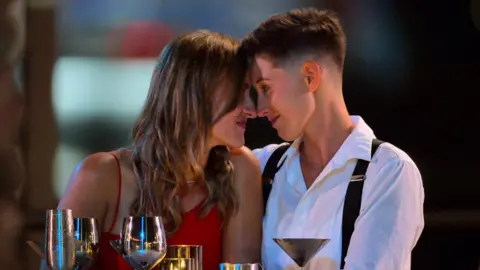 Netflix
NetflixSuccessful shows share a few essential ingredients. The key thing for viewers is drama, McMurray said.
"They love the drama. There's a soapiness, an addictive quality to these shows when they're on every night and run for weeks on end. You get invested, you get sucked in.
"People love the romance, a fairy tale - it could happen to them. Seeing love blossom is amazing."
The choice of participants is crucial, and and these shows provide escapism, he said. "They're very glossy and glamorous, a lot of these formats."
Dating will always be easy to relate to because "love it's a universal thing", according to Netflix's UK director of unscripted programming, Daisy Lilley.
New ideas
"Everyone understands it," she said. "It doesn't matter what age you are, it doesn't matter what type of person you're into.
"We enjoy watching people fall in love, splitting up and everything in between. And there are so many different ways to [show] that."
Indeed, in recent years producers have found increasingly creative and surprising ways to bring people together on screen.
"Every time I think I've heard it all, a production company will come in and pitch something and I'll go, 'I've never heard that one before,'" Lilley said. "It happens all the time. So it's an evergreen subject."
Netflix's roster includes Love Is Blind, in which singles date and get engaged before setting eyes on each other. At the TV festival on Thursday, the streaming giant announced that husband-and-wife Matt and Emma Willis will host the UK version.
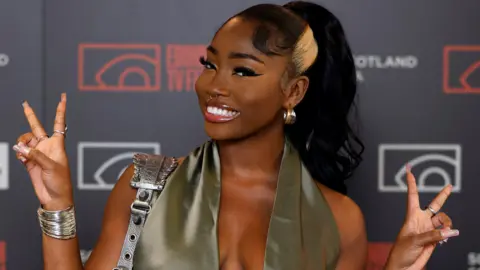 Duncan McGlynn/Shutterstock
Duncan McGlynn/ShutterstockIndiyah Polack, who was a contestant on last year's Love Island, is a fan of Love Is Blind.
"People might look at dating shows as a little bit superficial," she said. "But the whole point of that [show] is you're not going for somebody's looks. You're actually taking time to get to know them, and I think that's actually quite nice."
Love Island still dominates the British TV dating scene. When Indiyah came out, she was surprised by the level of interest.
"But then I understood that, if you're watching somebody every day, you do get invested. I also used to watch Love Island so I was the same, shouting at the telly going, 'What are you doing?'"
But the ITV show has been losing its shine. This summer's final was watched by 1.7 million people - about half the number who watched the series climax last year.
Love Island shake-up
Executive producer Mike Spencer said the latest series also registered 1.4 billion video views across Love Island's social platforms.
It is still "so relatable", he said. "Especially for the younger audience. They see themselves, and it starts a conversation."
Nevertheless, bosses have shaken up the format for a new-look winter series titled Love Island Games, which will be filmed in Fiji and feature previous contestants from the UK, US and Australian versions.
They will take part in competitive challenges as well as the usual coupling up, hosted by Maya Jama.
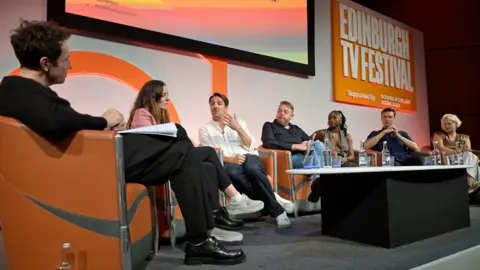 Wattie Cheung
Wattie CheungITV is also hoping to make a splash with My Mum Your Dad, hosted by Davina McCall, which has been dubbed "middle-aged Love Island". It is due to launch this autumn.
Meanwhile, McMurray has commissioned E4's Love Triangle, in which singles must choose between two possible partners.
There is room for more dating shows, but they must be original, he said.
Derivative formats
"If you want to launch something new, it's got to be distinctive. It's a very crowded marketplace and there are some formats that feel derivative and very similar to things that are already out there, and those tend to do less well."
TV and radio presenter Nick Grimshaw, who hosted the TV festival debate, said watching dating shows used to be a guilty pleasure.
"I used to think it was a guilty thing. And over the past few years I'm like, no, I will happily shout about loving dating shows.
"The guilty pleasure thing really needs to go, doesn't it? Don't feel guilty. Just pleasure."
